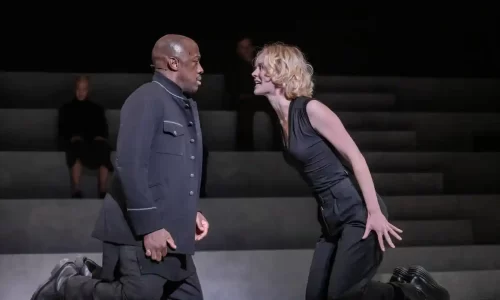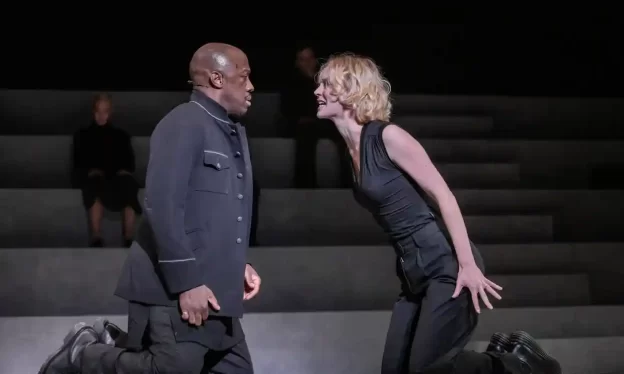 United Kingdom National Theatre Live’s Othello: filmed live (directed by Matthew Amos) on the Lyttleton stage of the Royal National Theatre and shown at Cineworld Basildon, Essex, 23.2.2023. (JPr)
United Kingdom National Theatre Live’s Othello: filmed live (directed by Matthew Amos) on the Lyttleton stage of the Royal National Theatre and shown at Cineworld Basildon, Essex, 23.2.2023. (JPr)

In a brief roundtable interval discussion about this Othello, director Clint Dyer (Deputy Artistic Director of The Royal National Theatre) explained ‘The idea for the type of production I wanted to do happened about 15/20 years ago in the sense that I had been watching lots of Othellos and felt that it wasn’t owning the context where I believed in the characters, in particular Othello … What you have got in the play as Shakespeare wrote it is a class conscious, status conscious, anxious bunch of anarchists and they are all in this kind of web of anxiety, Iago thinks he has made the web but no he’s scrambling around with everyone else … and the lies Iago tells only work because there is this structure [to society].’ And it is society that this production suggests is responsible for Othello’s downfall and Desdemona’s ultimate fate: in Dyer’s staging society is almost ever-present as sort of Greek chorus as the System or ensemble.
We heard how Othello is rife with racism and misogyny which is frequently overlooked when the focus is simply on jealousy. It is also about power and for Dyer Othello ‘is a domestic tragedy and it is clearly in Shakespeare’s mind to show us the tragedy of a woman [or women?] being abused by men.’ He considers ‘Desdemona is a heroine … it’s not just about their love for each other, we are also making a statement about where we politically lie.’
For Dyer, Iago is ‘violently racist, literally the language that he uses is so abhorrent, and again this is why we have the System watching so we can almost look at ourselves wanting to laugh at that. And so, it is about us recognising “Oh, god we used to laugh at that, or we still do when why do we want to laugh at that?’
I have written elsewhere about my history with Othello and my first one was a 1980 Royal Shakespeare Company’s performance at London’s Aldwych Theatre with the late Sir Donald Sinden ‘blacked up’ as Shakespeare’s moor. (Sinden’s slow, over-deliberate, enunciation of ‘Des – daaay – mooow – naaa’ still resonates with me over 40 years later.) The handout for this National Theatre Live screening had an extract from an article by Paul Prescott (in the Othello programme) and he discussed how for over four hundred years ‘Othello’s race was cosmetically produced, an ocular trick: white actor + black make-up = Othello. What audiences were seeing was a lie. From the 1980s onwards, it became normative for Black actors to play the role. They overwhelmingly found themselves the lone non-white figure in a cast of white actors. This has changed in the last ten years.’ Oddly, Giles Terera’s Othello was indeed ‘the lone non-white figure’ in the principal cast, perhaps this was to underline the racism and Othello’s isolation in the play, but this was never addressed in the interval talk.
Dyer begins by having the stage (almost literally by an actor) swept clean of all that has gone before from 1634 to 2022 with its backdrop of an ever-changing projection of images from previous Othello productions. Chloe Lamford’s abstract set has tiered steps on three sides which will be sat on or rushed up and down. Above is a rectangle of white light which can be lowered, especially when Othello is assuaged with doubts about Desdemona’s fidelity. For me it suggested a boxing ring and seemed to complement all the martial arts and punching bag bashing of Terera’s very physical Othello.
Clothing was mostly black and stripped what we saw of any specific time and place, though there are hints of military uniforms for some and what Othello and Desdemona wore hinted at North Africa at times. If anything, we are reminded of Italian Blackshirts and similar fascist organisations of the 1920s and 30s particularly with the System’s baying mob brandishing their flaming torches at the start. During one scene of Othello’s self-doubt the System appear bearing riot shields and blackface masks with red lips, and the reason for this escaped me. Elsewhere their use was much better as witnesses to the internal thoughts of the characters, and this was aided and abetted by Jai Morjaria’s effective lighting and an often-ominous sounding electronic score.
Terera is a proud, generally soft-spoken Othello who bravely bears the scars of his time as a slave and this – as in similar approaches to this role – makes his outbursts of anger and violence all the more unexpected, explosive and frightening. While we don’t immediately see beyond Iago’s racism, we know how Othello’s ensign feels he has been unfairly passed over for promotion as lieutenant and he ‘acts’ as Othello’s confidant and trusted advisor whilst plotting to manipulate him into demoting his rival, the noble and falsely-maligned Cassio (Rory Fleck Byrne). Paul Hilton’s Iago is an unlikely ensign but is evil-incarnate, part Hitler, though strangely, with some of the exasperation and mannerisms of John Cleese’s Basil Fawlty. Terera and Hilton spar well together during all the deception and betrayal that exacerbates Othello’s mental decline and also results in Terera’s terrifyingly realistic epileptic fit.

As Dyer suggested nobody in the play is happy and that is certainly true of Tanya Frank’s Emilia who is shockingly abused by Iago (her face shows the evidence of his brutality) yet she is still anxious for her husband’s approval and affection until the end of the play. Rosy McEwen’s Desdemona was extraordinarily self-assured bringing a steely resolve to even the meekest of lines. It makes it perfectly understandable how she would repeatedly petition – just as Iago wants her to do – for Cassio’s reinstatement to Othello’s dismay (he believes they are lovers)
Also catching the eye in an accomplish cast is Kirsty J Curtis’s sparky Bianca and indeed it is all three women who are the heroines of this Othello. Witness Emilia’s monologue about the strength of women (and wives particularly) and the heroics of Frank’s character at the play’s blood-soaked denouement when Emilia finally decides to stand up to her husband and dies by his hand. Hers was some of the best acting of the entire play.
I am not by nature keen on reimagining the great works we are familiar with, but we were reminded during the interval of the #MeToo movement, and I suspect everyone watching this Othello would – like me – have applauded Emilia and Desdemona surviving at the end, victims no longer.
Jim Pritchard
Production:
Director – Clint Dyer
Set designer – Chloe Lamford
Costume designer – Michael Vale
Lighting designer – Jai Morjaria
Sound design and Composition – Pete Malkin, Benjamin Grant
Co-Composer – Sola Akingbola
Movement director – Lucie Pankhurst
Co-Video designers – Nina Dunn, Gino Ricardo Green
Fight director – Kev McCurdy
Cast (in alphabetical order):
Roderigo / System – Jack Bardoe
Messenger / System – Joe Bolland
System – Peter Eastland
Cassio / System – Rory Fleck Byrne
Bianca / System – Kirsty J Curtis
Emilia / System – Tanya Franks
Gentleman / Officer / System – Colm Gormley
Iago – Paul Hilton
Montano / System – Gareth Kennerley
Lodovico / System – Joshua Lacey
Desdemona – Rosy McEwen
Duke of Venice / System – Martin Marquez
System – Katie Matsell
System – Amy Newton
System – Sabi Perez
Senator / System – Steffan Rizzi
Brabantio / Gratiano / System – Jay Simpson
Othello – Giles Terera
Senator / Voice / System – Ryan Whittle
For more about National Theatre Live click here.
